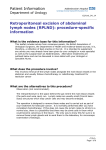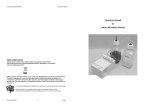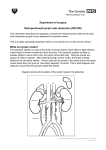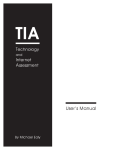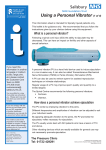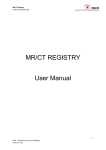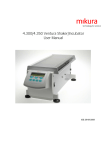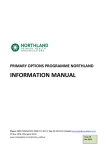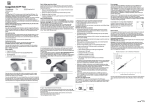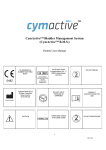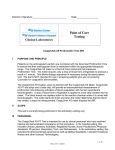Download Lymph Node Removal
Transcript
The British Association of Urological Surgeons 35-43 Lincoln’s Inn Fields London WC2A 3PE Phone: Fax: Website: E-mail: +44 (0)20 7869 6950 +44 (0)20 7404 5048 www.baus.org.uk [email protected] RETROPERITONEAL EXCISION OF ABDOMINAL LYMPH NODES INFORMATION FOR PATIENTS What evidence is this information based on? This booklet includes advice from consensus panels, the British Association of Urological Surgeons, the Department of Health and other sources. As such, it is a reflection of best urological practice in the UK. You should read this booklet with any advice your GP or other healthcare professional may already have given you. We have outlined alternative treatments below that you can discuss in more detail with your urologist or specialist nurse. What does the procedure involve? Removal of the lymph nodes alongside the main blood vessels in the abdomen. It usually follows chemotherapy or radiotherapy treatment for testicular cancer What are the alternatives to this procedure? The only alternative to this procedure is observation, and this is not recommended. The retroperitoneum is the space behind the bowels where the main blood vessels (the aorta and vena cava) run. Lymph nodes are small (bean-sized) structures which trap cancer cells and may become enlarged. The operation is designed to remove these nodes and is carried out as part of the treatment for some testicular cancers. It is normally performed after you have completed chemotherapy. If the lymph nodes do not shrink to a normal size after treatment, there may be some cells in them that could become cancerous in the future. The only way to be sure is to remove these lymph glands and examine them microscopically (histology). In some cases, a laparoscopic (keyhole) approach might be possible. What should I expect before the procedure? Although you will have discussed issues of sterility with your urologist or oncologist, it is important to be aware that the nerves which control ejaculation run through the middle of the surgical area. We always try to preserve these nerves. However, there is often a lot of scar tissue around the nerves after the chemotherapy treatment. Removal of the nerves can result in weak or absent ejaculation after the operation. Semen may even go backwards into your bladder instead of coming out through your penis (a "dry" orgasm). This is not, of course, harmful and the semen is flushed Page 1 away with your urine. If this does occur, it is very likely that you will be sterile. This does not always happen and you urologist may be able to tell you if it is likely in your case. If you have not already done so, it may be possible for you to store semen as a precaution and you should discuss this with your urologist before the procedure. You will usually be admitted to hospital on the same day as your surgery. You will normally receive an appointment for a “pre-assessment” to assess your general fitness, to screen you for MRSA and to do some baseline investigations. Once you have been admitted, you will be seen by members of the medical team which may include the consultant, specialist registrar, house officer and your named nurse. On the day before your operation, you will only be allowed to drink clear fluids such as water, squash, black tea or coffee. You may also be given a laxative to clear your bowel. Immediately before the operation, the anaesthetist may give you a premedication which will make you dry-mouthed and pleasantly sleepy. You will be given an injection of a drug called Clexane under your skin. Together with elasticated stockings provided by the ward, this will help to prevent venous thrombosis (clots in your legs) Please tell your surgeon (before your surgery) if you have any of the following: An artificial heart valve A coronary artery stent A heart pacemaker or defibrillator An artificial joint An artificial blood-vessel graft A neurosurgical shunt Any other implanted foreign body A regular prescription for warfarin, aspirin or clopidogrel (Plavix®) A previous or current MRSA infection A high risk of variant-CJD (if you have had a corneal transplant, a neurosurgical dural transplant or injections of human-derived growth hormone). When you are admitted to hospital, you will be asked to sign the second part of your operation consent form giving permission for your operation to take place, showing you understand what is to be done and confirming that you want to go ahead. Make sure that you are given the opportunity to discuss any concerns and to ask any questions you may still have before signing the form. What happens during the procedure? A full general anaesthetic is normally used and you will be asleep throughout the procedure. You will usually be given an injection of antibiotics before the procedure, after you have been checked for any allergies. The anaesthetist may also use an epidural or spinal anaesthetic to reduce the level of pain afterwards. The surgeon will make a long incision will be made in your tummy (pictured below) to allow the necessary lymph nodes to be removed. RETROPERITONEAL EXCISION OF ABDOMINAL LYMPH NODES Page 2 The operation normally takes three to six hours hours to perform. What happens immediately after the procedure? You should be told how the procedure went and you should: ask the surgeon if it went as planned; let the medical staff know if you are in any discomfort; ask what you can and cannot do; feel free to ask any questions or discuss any concerns with the ward staff and members of the surgical team; and make sure that you are clear about what has been done and what happens next. You will wake up in the recovery area where your condition will be closely monitored until you are ready to return to the ward. Some men require observation in the intensive therapy unit (ITU) to allow closer monitoring. Visiting times in these areas are flexible and will depend on when you return from the operating theatre. You will have a drip to keep you hydrated, through which you can also be given medication. You will be given separate information about patient-controlled analgesia (PCA) or an epidural anaesthetic which are designed to reduce the level of pain afterwards. You will be given oxygen via a mask or nasal spectacles. You will usually have a bladder catheter put in and the wound is usually closed with staples; these are removed after seven to 10 days. You will receive physiotherapy, starting on the day after the operation, to encourage movement, deep breathing and leg exercise. You can usually start drinking water two to three days after the procedure. Once bowel activity has returned, you will be able to drink and eat freely. The average hospital stay is nine days. Are there any side-effects? Most procedures have possible side-effects. But, although the complications listed below are well-recognised, most patients do not suffer any problems. Common (greater than 1 in 10) Problems with ejaculation failure after the surgery. Accumulation of lymph fluid after the operation, needing drainage. Infection, pain or bulging of the incision site beeding further treatment. The microscopic examination of the lymph nodes may subsequently show no sign of cancer in the lymph glands removed. Occasional (between 1 in 10 and 1 in 50) Bleeding requiring further surgery or transfusions. RETROPERITONEAL EXCISION OF ABDOMINAL LYMPH NODES Page 3 It may not be possible to remove the nodes without removing the kidney on the affected side. Need for further treatment of the cancer. Involvement or injury to nearby local structures (blood vessels, spleen liver, lung, pancreas and bowel) requiring more extensive surgery. Rare (less than 1 in 50) Anaesthetic or cardiovascular problems possibly needing intensive care admission (including chest infection, pulmonary embolus, stroke, deep vein thrombosis, heart attack and death). Entry into the lung cavity needing insertion of a temporary drainage tube. Hospital-acquired infection Colonisation with MRSA (0.9% - 1 in 110). MRSA bloodstream infection (0.02% - 1 in 5000). Clostridium difficile bowel infection (0.01% - 1 in 10,000). The rates for hospital-acquired infection may be greater in high-risk patients, for example those patients with long-term drainage tubes; who have had their bladder removed due to cancer; who have had a long stay in hospital; or who have been admitted to hospital many times. What should I expect when I get home? When you are discharged from hospital, you should: be given advice about your recovery at home; ask when you can begin normal activities again, such as work, exercise, driving, housework and sex; ask for a contact number if you have any concerns once you return home; ask when your follow-up will be and who will do this (the hospital or your GP); and be sure that you know when you get the results of any tests done on tissues or organs that have been removed. When you leave hospital, you will be given a “draft” discharge summary. This contains important information about your stay in hospital and your operation. If you need to call your GP or if you need to go to another hospital, please take this summary with you so the staff can see the details of your treatment. This is important if you need to consult another doctor within a few days of being discharged. You will require a minimum six-week period of convalescence but, after this, you should be able to resume exercise gradually. Your return to work will depend on the type of work you do. Very heavy manual labour might require up to three months off work but light work only two months or so. RETROPERITONEAL EXCISION OF ABDOMINAL LYMPH NODES Page 4 What else should I look out for? You should watch out for signs of inflammation of the wound or swelling of the abdomen which might indicate fluid collection. Are there any other important points? You have had a large operation and will feel tired when you get home. It is, therefore, important to rest and, in the ealy days, you may feel like having a sleep during the day. It is also important to take exercise regularly; this should be very gentle at first but you can build up your activity up as your energy returns. You may not feel fully recovered for six to 12 weeks. The area around your incision will heal quickly but you may wish to cover it with a dressing to keep it clean and dry. You should keep physical activity to a minimum for the first 10 days after returning home. If you require a sick certificate, you can obtain this from the ward to cover the time you spent in hospital. Thereafter, you will need to obtain a further certificate from your GP. It will be 14 to 21 days before the biopsy results on the tissue removed are available. All biopsies are discussed in detail at a multi-disciplinary meeting before any further treatment decisions are made. You and your GP will be informed of the results after this discussion. You will normally be reviewed in outpatients six weeks after your operation to monitor your progress. Your oncologist, however, will normally arrange to see you earlier than this (after two to three weeks) to discuss the pathology (biopsy) results. If you have any concerns about this, please contact your oncologist or testicular cancer nurse. Driving after surgery It is your responsibility to make sure you are fit to drive following your surgery. You do not normally need to tell the DVLA that you have had surgery, unless you have a medical condition that will last for longer than three months after your surgery and may affect your ability to drive. You should, however, check with your insurance company before returning to driving. Your doctors will be happy to give you advice on this. Is any research being carried out in this area? Before your operation, your surgeon or specialist nurse will tell you about any relevant research studies taking place. In particular, they will tell you if any tissue that is removed during your surgery will be stored for future study. If you agree to this research, you will be asked to sign a special form giving your consent. All surgical procedures, even those not currently undergoing research, are audited so that we can analyse our results and compare them with those of other surgeons. In this way, we learn how to improve our techniques and results; this means that our patients will then get the best treatment available. RETROPERITONEAL EXCISION OF ABDOMINAL LYMPH NODES Page 5 What should I do with this information? Thank you for taking the trouble to read this booklet. If you want to keep a copy for your own records, please sign below. If you would like a copy of this booklet filed in your hospital records for future reference, please let your urologist or specialist nurse know. However, if you do agree to go ahead with the scheduled procedure, you will be asked to sign a separate consent form that will be filed in your hospital records; we can give you a copy of this consent form if you ask. I have read this booklet and I accept the information it provides. Signature............................................................... Date........................................... RETROPERITONEAL EXCISION OF ABDOMINAL LYMPH NODES Page 6 How can I get information in alternative formats? Please ask your local NHS Trust or PALS network if you require this information in other languages, large print, Braille or audio format. Most hospitals are smoke-free. Smoking can make some urological conditions worse and increases the risk of complications after surgery. For advice on stopping, contact your GP or the free NHS Smoking Helpline on 0800 169 0 169 Disclaimer While we have made every effort to be sure the information in this booklet is accurate, we cannot guarantee there are no errors or omissions. We cannot accept responsibility for any loss resulting from something that anyone has, or has not, done as a result of the information in this booklet. The NHS Constitution Patients’ Rights & Responsibilities Following extensive discussions with staff and the public, the NHS Constitution has set out new rights for patients that will help improve your experience within the NHS. These rights include: a right to choice and a right to information that will help you make that choice; a right to drugs and treatments approved by NICE when it is considered clinically appropriate; a right to certain services such as an NHS dentist and access to recommended vaccinations; the right that any official complaint will be properly and efficiently investigated, and that patients will be told the outcome of the investigations; and the right to compensation and an apology if you have been harmed by poor treatment. The constitution also lists patients’ responsibilities, including: providing accurate information about their health; taking positive action to keep yourself and your family healthy. trying to keep appointments; treating NHS staff and other patients with respect; following the course of treatment that you are given; and giving feedback (both positive and negative) after treatment. © British Association of Urological Surgeons (BAUS) Limited Published: March 2014 Due for review: March 2015 RETROPERITONEAL EXCISION OF ABDOMINAL LYMPH NODES Page 7







